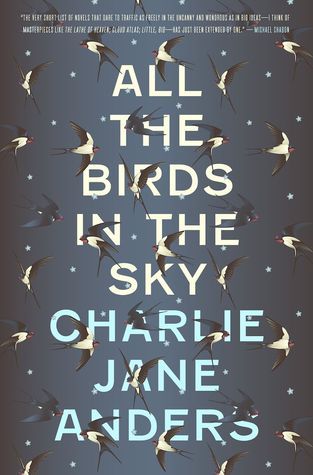SNQ: Charlie Jane Anders’s “All the Birds in the Sky”
by Miles Raymer

Summary:
Charlie Jane Anders’s All the Birds in the Sky is a fantasy novel about Laurence and Patricia, two protagonists who meet first as children and then reconnect as young adults. Laurence has a gift for inventing advanced technology, and Patricia is a witch who excels at communing with nature and channeling its power. As they struggle to find their footing in an increasingly unstable world, both characters get involved in bizarre, radical cults that seem to be destroying humanity through their quixotic attempts to save it. And when modern life begins to crumble around them, the global importance of Laurence and Patricia’s special connection reveals itself.
Key Concepts and Notes:
- In general, I disliked almost everything about this book. So, I’ll begin with what I did like. All the Birds can be whimsical and fun if you just let it wash over you and don’t think too hard. The main characters are well-realized, and their relationship is occasionally quite touching. The book contains some good turns of phrase, as well as some acerbic and spot-on critiques of both the “New Age” and “Tech” cultures of San Francisco and California more generally. There’s also a final message about epistemic humility that I can get behind.
- Now for my many complaints. First, I found many sentences in this book to be nonsensical. Not creative, just actually nonsensical. The dialogue is also strangely stilted––not at all representative of how Californians really talk. Additionally, Anders’s language is often crude at random and unnecessary moments. I got the feeling that she was trying way too hard to be edgy and unconventional with her language and just went off the deep end without any decent editors to rein her in. That’s a shame became there’s also some decent writing in there, but you have to hunt for it.
- Beyond the writing itself, the plot structure skews way too far toward randomness and isn’t nearly coherent enough. Readers who dig absurdism will probably nod along, but to me it just felt like Anders was making everything up as she went.
- Laurence and Patricia are okay, but just okay. They’re both sort of likable and sort of shitty, and they kind of make each other better but not in a way that I found satisfying. They both have a super juvenile vibe of “ugh, the whole world’s against me and it’s soooo exhausting.” I was occasionally interested in them but never really rooting for them.
- There are a lot of supporting characters, but almost all of them are forgettable and half-baked. One possible exception is a supercomputer that Laurence builds in boyhood and that returns later in the story, which is a memorable but completely unbelievable depiction of a conscious artificial intelligence.
- The novel’s central conflict is driven by the yawn-inducing “nature vs. technology” false dilemma, complete with plenty of predictable hand-wringing about evil human inventions annihilating the natural world. By the end, Anders demonstrates some insight into the limitations of this premise, but there’s a bigger problem: she doesn’t seem to understand technology in any serious way. Her depictions of technology might as well be pulled from a fantasy novel, so she’s pitting magic against magic but calling them different things. It doesn’t work. I was drawn to the book because I thought it would be fascinating to read about a clash between plausible-seeming technology and witchcraft, but found myself disappointed.
- Finally––and I will admit that this is a tiny nitpick––there’s a blurb on the front cover where Michael Chabon compares this book to David Mitchell’s Cloud Atlas. This is just so laughable that I had to call it out. Cloud Atlas is an absolute masterpiece of modern fiction; All the Birds is a second-rate fantasy romp––good for a few sittings of diversion but neither impressive nor profound.
Favorite Quotes:
A society that has to burn witches to hold itself together is a society that has already failed, and just doesn’t know it yet. (72)
When the whole world turns chaotic, we must be the better part of chaos. (227)
We don’t need better emotional communication from machines. We need people to have more empathy. The reason the Uncanny Valley exists is because humans created it to put other people into. It’s how we justify killing each other. (265)
A cyborg…will be the same thing as a wizard. We’re working on it, anyway. Give us a little time. (312)